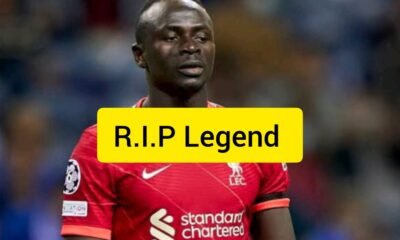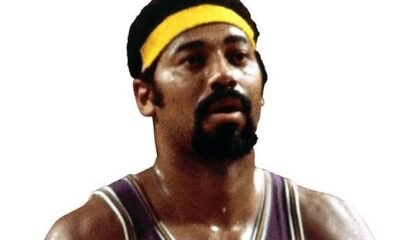Blog
Larry Bird shares his perspective on why he was never fond of flaunting money: “I …
Larry Bird Explains Why He Never Liked Throwing Money Around: The Wisdom of a Basketball Legend
In the world of professional sports, the stories of athletes who earn millions often come with tales of lavish lifestyles, extravagant spending, and ostentatious displays of wealth. Yet, amidst this backdrop of excess, few players are as renowned for their humility and grounded nature as Larry Bird. The Boston Celtics legend and three-time NBA champion has recently shared insights on his personal philosophy regarding money and wealth, shedding light on a mindset that has long fascinated fans and analysts alike.
### A Background of Humility
Born in West Baden Springs, Indiana, Bird grew up in a working-class family. He was the fourth of six siblings, and his early life was marked by a commitment to hard work and perseverance. Raised by a single mother after his parents divorced, Bird learned the value of money at a young age. This upbringing shaped his views on financial responsibility and contributed to his modest approach to wealth.
Despite his incredible success on the basketball court, where he averaged 24.3 points, 10.0 rebounds, and 6.3 assists per game over a stellar 13-year career, Bird remained grounded. He played for the Celtics from 1979 to 1992, becoming a symbol of resilience and dedication in a sport that has seen many players lose themselves to fame and fortune.
### Larry’s Frugality
In recent interviews, Bird has candidly expressed that he never felt comfortable “throwing money around.” He emphasized that financial prudence is integral to his identity. “I grew up in a family where we didn’t have much,” Bird explained. “We learned to appreciate the value of a dollar. Money isn’t something you should flaunt; it’s a means to provide for yourself and your loved ones.”
Bird’s perspective resonated with many because of its authenticity. He has often been a proponent of living within one’s means and emphasized the importance of saving and investing wisely. His approach diverges sharply from the stereotype of athletes who squander their earnings on luxurious items and extravagant lifestyles.
### Living a Simple Life
Even after achieving NBA stardom and securing a place in the Basketball Hall of Fame, Bird maintained a relatively low-key lifestyle. He has spoken about how he prefers simple pleasures over lavish indulgences. “I’d rather spend my time fishing or playing golf with friends than going to the hottest club or buying the latest car,” Bird remarked. This philosophy aligns with his values of connection, friendship, and authenticity.
Bird’s choice to live modestly extends beyond personal comfort; it reflects his upbringing and the people in his life. The influence of his mother and the values she instilled in him play a significant role in how Bird perceives wealth and success. “My mom taught me that money doesn’t buy happiness,” he shared. “It’s about the relationships you build and the legacy you leave behind.”
### A Lesson for Future Generations
Bird’s reflections on money and success are particularly relevant in today’s society, where young athletes are thrust into the spotlight at an early age. With endorsements, sponsorships, and substantial salaries, finding a balance between enjoying the fruits of one’s labor and making sound financial decisions can be daunting. Bird’s experiences serve as a cautionary tale as well as guidance.
He has urged young athletes to educate themselves about financial management. Bird believes that understanding how to handle money can empower athletes to make informed decisions that will benefit them long after their playing days are over. “I always tell young players to get good advice and to save,” Bird advised. “You never know what might happen in life, and being smart with your finances can set you up for the future.”
### Philanthropy and Giving Back
Despite his frugal nature, Bird understands the importance of giving back to the community. He has been involved in numerous charitable activities throughout his life, supporting youth programs and initiatives in Indiana and beyond. His approach to philanthropy reflects a deep-seated belief that true wealth is measured by one’s impact on others, not by material possessions.
Bird’s philanthropic efforts often focus on educational initiatives and support for underprivileged children. By investing in future generations, he aims to create opportunities for those who may not have the same advantages he did growing up. “Helping others is one of the most fulfilling things you can do,” he said. “It’s not about how much money you have; it’s about how you can make a difference.”
### The Influence of Bird’s Legacy
Larry Bird’s legacy goes beyond his remarkable achievements on the court. His approach to life, money, and success has left an indelible mark on the NBA and its players. Many young athletes view him as a role model not just for his athletic prowess but also for his character and values.
As the sports world evolves, Bird’s message about financial responsibility continues to resonate, especially in an age when many athletes grapple with the challenges of newfound wealth. The lessons he’s shared about saving, investing, and maintaining authenticity serve as valuable reminders for athletes and fans alike.
### Conclusion
Larry Bird’s recent reflections on money and wealth encapsulate his life philosophy: that true success is defined not by material possessions but by personal values, relationships, and the ability to make a positive impact on the world. His experiences and lessons, born out of a humble upbringing, serve as essential guidance for younger generations, reinforcing the idea that how one handles money speaks volumes about character.
In a world often obsessed with monetary success, Bird’s perspective serves as a grounding force. His approach offers a road map for not only athletes but anyone seeking a fulfilling life, reminding us that it’s not about how much money we have, but how we choose to spend it—both in terms of currency and the larger currency of life itself.
As Bird himself famously said, “I don’t care how much money you make; it’s what you do with it that matters.” This sentiment echoes through the ages as a reminder that wisdom, humility, and a genuine connection to one’s roots truly define a person’s legacy.
-

 Arsenal2 years ago
Arsenal2 years agoSad News Arsenal ex player who is goal scorer confirmed dead this morning
-

 Liverpool2 years ago
Liverpool2 years agoSad News Sadio Manè Confirmed Dead Today By Sky Sports Reporters, Open For Full Story 👇
-

 Blog1 year ago
Blog1 year ago“I was forcefully removed from Manchester United squad and now I’ve joined the best team in the world…I will revenge and as a result, I’ve ordered my friend who’s their best player currently to leave there with immediate effect and he has agreed”: Former Man United player angered by United decision to removed him from the squad as he ordered the Club’s best player to leave immediately.
-

 Blog1 year ago
Blog1 year agoSad News: Manchester United player died when playing for his country England yesterday 😢 😔
-

 Blog2 years ago
Blog2 years agoR.I.P: Formal Real Madrid and France international confirm death this morning
-

 Chelsea2 years ago
Chelsea2 years agoBreaking New:”Roman Abramovich could get Chelsea back”? Chelsea owner review the conversation between him and Roman Abramovich in. Deal about getting Chelsea back
-

 Blog2 years ago
Blog2 years agoUNBELIEVABLE: Manchester City midfielder KELVIN DE BRUYNE divorced wife this morning after DNA test revealed their 5 years old son belongs to formal Manchester United player
-

 Manchester United1 year ago
Manchester United1 year agoOFFICIAL NOW: Manchester United announce the signing of 23yr sensational player after beating Liverpool and Madrid for His signature, agreement reached on a 5yr deal, Medical completed – announcement ongoing












